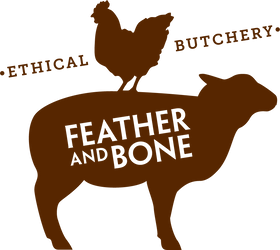Christmas & the definition of luxury
Personally, the Christmas juggernaut fills me with a storm of conflicting emotions.
On one hand, I feel an overwhelming urge to ball up into the fetal position and hide under the table with a bottle of gin. On the other hand, it's sort of exciting and the prospect of all that feasting and indulgence is deeply appealing to my lurking inner glutton. But then, with my third hand, along with my third eye, I also feel deeply discomforted by the excessive consumption and the tricky questions it raises around notions of quality and value and what that means for merchants like us.
We've been grappling with perceptions of luxury vs affordability and quality vs value in our business for the last ten years so it's nothing new. It's just that it's amplified by the scale of consumption at Christmas time so it becomes more stark.
In September, I sat next to a stranger at a Sydney food writing festival. She told me of her passion for sustainability and dream of setting up a holistic, permaculture farm out of Sydney. When I told her what I do, she gushed about a ham her family had purchased from us last year for Christmas and how delicious it was and how wonderful Feather and Bone is and what great work the farmers we represent do.
I was experiencing a warm glow of smug satisfaction until she said, 'Of course, personally, I can't afford to eat Feather and Bone meat.' It was a bit like being lovingly stroked and then suddenly slapped across the chops without explanation.
I didn't bother going into the whole 'If you really believe in sustainability then you might think that you can't afford NOT to eat food from people like us' thing.
I also didn't bother telling her that if she actually did a price comparison between the organic offerings of Feather and Bone and the Woolworths meat display she'd find that, in many cases, at various times of the year, Woolworths is more expensive. This is because Woolworths' agents (like almost every other retailer of meat in Australia) pay farmers according to the fluctuating market price whereas Feather and Bone pay farmers an independent, fixed, annual rate determined by mutual agreement that allows both parties to plan and manage with security and confidence.
But the exchange did get me thinking, again, about the concept of value. One man's treasure etc.
We're sometimes referred to as operating at the ‘luxury’ end of the market which is always disconcerting as it’s certainly not how we see ourselves or how we live. (Frankly, if you saw the state of The Pit after 12 years of raising three feral boys or took a ride in my old white van - tastelessly called the Pedo Van by said ferals - you'd get it.) But, given that most of our produce is often three or four times more expensive than what you’d get at one of the big supermarkets or at one of the conventional butcher chain stores, we can sort of understand why some might think of us as ‘luxury’. Also, it’s true that we’re unashamedly committed to really good quality produce.
I guess it depends on whether you think that knowing where your food comes from and how it’s grown is a luxury or a consumer right. Or if you think that chemical-free, highly nutritious food produced in an environmentally-sustainable production framework that provides for optimum animal welfare is a luxury or something important, necessary and valuable. And whether, in order to be able to afford to eat this kind of food, you’re prepared to put the effort in to educate yourself a little. Maybe even do without a little.
We should all probably be eating meat a little less than we do. We shouldn’t be eating prime cuts - breast, tenderloin, fillet - at every meal and the cheaper, secondary cuts of meat are just as delicious if you take the time to learn what they are and how to cook them. In other words, spend the same amount of money but eat a little less and a little more selectively.
Of course, there’s a whole story that explains why the meat we sell is more expensive and it’s not because the animals we sell are drinking from marble fountains, eating truffles and being groomed for the tables of the super rich.
It’s partly because the true cost of intensively-produced food isn’t being passed on to the consumer so the cost comparison isn’t a fair one. If you were to factor in the farming subsidies and the health and environmental reparation costs of intensively produced meat you’d find that the dollar value of factory-farmed food would be much higher.
But it’s also because the produce we buy is grown by farmers who are determined to leave the land they manage in better shape than when they arrived and who don’t cut corners and go to great lengths to ensure this is the case.
These are farmers who don’t prop up the fertility of their soils with chemical fertilisers or pesticides but instead work in concert with natural systems to achieve optimum soil health. Farmers who consciously choose not to cram as many animals onto their land as possible but instead only stock the number of animals that the land can carry without undue stress and the need for artificial support. Farmers interested in genetic diversity who grow a variety of different breeds of animals. Farmers who are both absolutely pragmatic about the future of the animals in their care and absolutely committed to providing those animals with the best quality of life possible.
You could say that eating meat produced this way is a luxury. Or you could say that, in fact, we may soon find that the community cost of the health and environmental consequences of eating meat produced in the intensive system is the real luxury.
Research into the implications of the prophylactic administration of antibiotics to animals in factory farms indicates that we might have sincere regrets about pumping all those drugs into the food chain. Just type ‘antibiotics in the food chain’ into Google if you need convincing. Then there’s the well-documented environmental problems resulting from the ineffective treatment of the huge volumes of animal faeces that are the byproduct of factory farms including leaching of toxic matter into local waterways, destruction of marine ecosystems and intolerable local air pollution.
That all sounds very doomsday and self-serving and doesn’t necessarily mean you should all become vegans and run screaming for the hills - or into our arms, warm and welcoming though they may be!
But it does mean that it’s worth thinking twice about your assumptions and that you might, in fact, be able to have your meat and eat it too.
Luxury...
While we're at it, please read this latest newsletter from Sift Produce which deals with the trials and tribulations faced by farmers and the attendant necessity for our purchasing patterns to support their work.
Sift Newsletter 7 December 2017: When it rains it pours




Do you have fruit and vegetables only on Saturdays????
Leave a comment